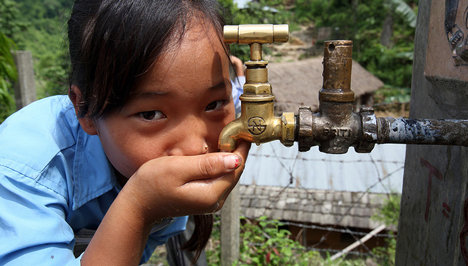Water is fundamental to all life on earth and underpins all human activity: food and energy production, physical health, life in cities, social stability. Climate change and water are inextricably linked. Climate change is exacerbating both water scarcity and water-related hazards such as floods and extreme weather events. Rising global population growth, increasing prosperity, the industrialisation of agriculture, urbanisation and pollution of water sources are placing unsustainable demands and pressures on the world's clean freshwater resources.
The World Economic Forum has rated water crises as a 'top five global risk' in terms of impact since 2012. Climate change increases the variability and unpredictability of water availability making it a risk multiplier for water security. It is predicted that over half of the world's population will live in water-stressed regions by 2050.
According to the UN, 3.6 billion people worldwide, nearly half the global population, lack access to safely managed sanitation. Concerningly, sanitation coverage reduced between 2015 and 2022 in the Oceania region. At the same time, some 2.2 billion people around the world do not have safely managed drinking water services, and 3 billion lack basic handwashing facilities.
Water, including water, sanitation and hygiene (WASH) and water resource management (WRM), is a key development, foreign policy and security issue for Australia and our partners in the region.
Given Australia's world-leading expertise in water, we have been strong supporters in the WASH and WRM sectors for decades.
How we are helping
Australian support for the water sector encompasses WASH and WRM.
WASH refers to the provision of drinking water and sanitation and hygiene services to communities. In Australia, WASH services are mainly provided by water utilities.
WRM refers to the management of water resources at large scale including aspects like dam storage, river basin management and water for agriculture.
Australia is a trusted regional leader in both WASH and WRM, with world-leading expertise and Indigenous knowledge going back thousands of years. Through our development program we harness Australia's expertise and work in partnership with governments and communities in our region to achieve greater water security and better access to WASH services.
We work with partners to:
- Increase focus on incorporating climate resilience into WASH and WRM.
- Strengthen health security through hygiene promotion campaigns and increased access to WASH facilities in schools, health care facilities and communities.
- Improve regional stability through technical support for government health communication campaigns and sharing Australian water sector knowledge on business continuity.
- Support and safeguard economies and livelihoods through improved water security for agriculture and the private sector, including the millions who work in the water sector.
Our approach is built around strong and enduring partnerships with partner governments, the private sector, NGOs and community organisations, multilaterals, regional organisations and other development agencies.
In line with the International Development Policy, Australia will measure its performance on water against the relevant criteria including:
- number of people using basic or safely managed drinking water services
- number of people using basic or safely managed sanitation services and/or a handwashing facility with soap and water
- number of people for whom Australia's investments have improved adaptation to climate change and resilience to disasters.
These performance indicators are linked to the Sustainable Development Goals. Australia advocates in regional and global forums for a comprehensive approach to water. Water intersects with every aspect of development and has its own Sustainable Development Goal 6 – Clean Water and Sanitation for All.
How we contribute
Australia supports a range of water initiatives across its bilateral, regional and global programs. These are scaling up their efforts to respond to climate change with our partners across the Indo-Pacific.
Australia's flagship Water for Women Fund supports climate-resilient WASH projects. Water for Women is delivering safe, equitable and sustainable WASH services and helping to build healthy, inclusive and resilient societies.
Australia's partnership with the United Nations Children's Fund (UNICEF) focus on climate-resilient WASH and data monitoring of WASH outcomes.
Australia also has highly valued technical and managerial capabilities in WRM. Through the Australian Water Partnership, we lend Australian water expertise to assist partner countries improve water security and accessibility, and the climate resilience of their water systems.
Through our investments in water, we support individuals, communities and countries to reach their development goals and develop resilience in the face of climate change.
See further information on programs addressing water initiatives.

